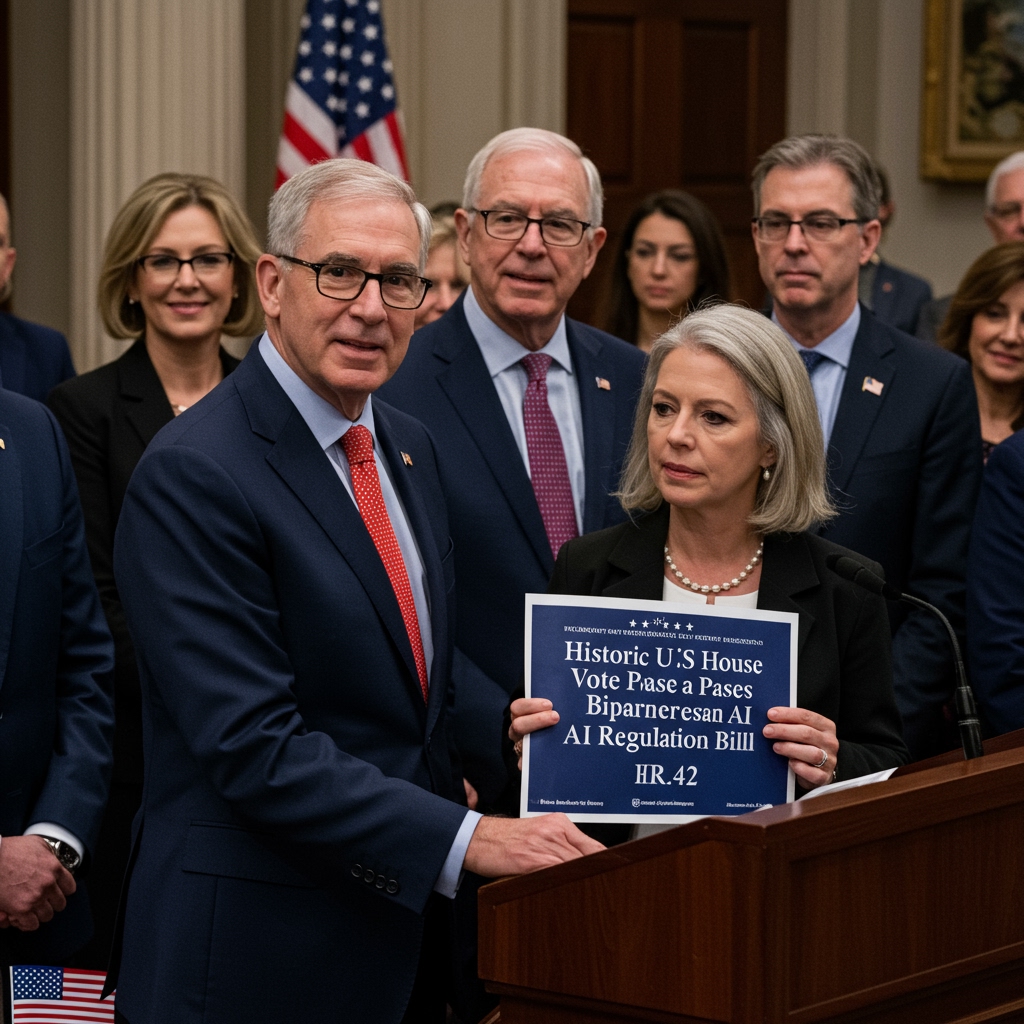US House Approves Landmark AI Regulation Bill
Washington D.C. – The U.S. House of Representatives today marked a significant legislative milestone, passing HR 42, officially known as the Artificial Intelligence Accountability and Transparency Act. The bill secured passage with a substantial bipartisan vote of 287-145, signaling growing consensus within Congress regarding the urgent need to establish federal guidelines for the rapidly evolving field of artificial intelligence.
The legislation represents a comprehensive effort to address potential risks and foster public trust in AI technologies across various sectors. Proponents argue the bill is a crucial step towards creating a responsible innovation ecosystem, ensuring that AI development and deployment are conducted with accountability and transparency at the forefront.
Key Provisions of the Artificial Intelligence Accountability and Transparency Act
Central to HR 42 are several key provisions designed to instill a framework of oversight and responsibility. One of the most significant measures is the mandate for mandatory risk assessments for high-impact AI systems. These systems, yet to be fully defined but expected to include applications in critical areas like employment, credit, housing, healthcare, and criminal justice, will be subjected to rigorous evaluation to identify potential biases, security vulnerabilities, and other risks before deployment.
Another cornerstone of the bill is the establishment of the new Federal AI Oversight Commission (FAIOC). This independent body will be tasked with implementing and enforcing the provisions of HR 42. Its responsibilities are expected to include developing specific rules and guidelines for risk assessments, investigating complaints related to AI systems, providing technical assistance to agencies and developers, and maintaining a public registry of high-impact AI systems. The creation of the FAIOC underscores the legislature’s recognition that existing regulatory structures may not be adequately equipped to handle the unique challenges posed by AI.
Bipartisan Support and Congressional Debate
The 287-145 vote reflects a rare moment of bipartisan agreement on a complex technological issue. Supporters from both sides of the aisle emphasized the need for proactive regulation to prevent potential harms associated with AI, such as algorithmic discrimination, privacy infringements, and opaque decision-making processes. They argued that clear federal standards would not only protect consumers and citizens but also provide much-needed clarity for businesses and developers, fostering predictable innovation rather than stifling it.
Debate surrounding the bill touched upon various concerns. While the large majority vote indicates broad support for the principle of AI regulation, some lawmakers raised questions about the scope of the FAIOC’s power, the potential compliance burden on smaller businesses, and the risk of stifling innovation through overly stringent rules. However, proponents countered that the bill strikes a necessary balance, focusing primarily on high-risk applications and providing a flexible framework that can adapt as AI technology advances.
Implications and Next Steps
The passage of HR 42 by the House is a pivotal moment in the nascent history of U.S. federal AI regulation. It signals a clear intent from Congress to move beyond discussions and towards concrete legislative action. For the AI industry, the bill necessitates a greater focus on ethical considerations, bias detection, and robust testing protocols, particularly for systems with significant societal impact. For the public, it promises increased transparency and accountability from the AI systems that increasingly influence daily life.
The bill now faces further scrutiny in the Senate. Its journey through the upper chamber will likely involve committee hearings, potential amendments, and robust debate. The degree to which the Senate will embrace the House’s framework remains to be seen, but the bipartisan nature of the House vote suggests a foundation for potential agreement exists. The legislative process is far from over, but today’s action by the U.S. House of Representatives represents a decisive step towards codifying federal oversight for artificial intelligence, setting a precedent for how the nation intends to govern this transformative technology.





